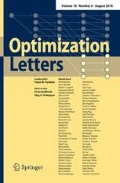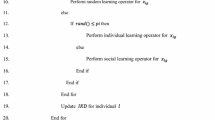Abstract
This paper investigates a three-competing group scheduling problem on serial-batching machines considering the setup time of groups and batches, as well as the job-dependent deteriorating effect, where the setup time of groups and batches depends on their own corresponding start time and deterioration rate, and the jobs’ actual processing time depends on their starting time and deterioration rate. In this problem, the jobs in three groups are processed competitively, and the jobs belonging to the same group are processed together on a machine, meanwhile, the jobs from each group are divided into batches. The objective is to minimize the makespan of one group with deterioration effect under the constraint of satisfying the threshold value of another group. Some key structural properties are proposed under the relevant demonstration, and a decision flow chart of scheduling rules is constructed based on these structural properties. Then, an effective improved differential evolution (DE) search algorithm combining the shaking operation from variable neighborhood search is developed to solve the studied scheduling problem. Computational experiments are conducted to evaluate the performance of proposed improved DE algorithm and some other well-known algorithms. The experimental results show that the proposed algorithm is more effective and stable than compared algorithms.





Similar content being viewed by others
References
Webster, S., Baker, K.R.: Scheduling groups of jobs on a single machine. Oper. Res. 43, 692–703 (1995)
Kuo, W.H., Yang, D.L.: Minimizing the total completion time in a single-machine scheduling problem with a time-dependent learning effect. Eur. J. Oper. Res. 174, 1184–1190 (2006)
Wu, W.H.: Solving a two-agent single-machine learning scheduling problem. Int. J. Comput. Integr. Manuf. 27, 20–35 (2014)
Li, D., Hsu, P.: Solving a two-agent single-machine scheduling problem considering learning effect. Comput. Oper. Res. 39, 1644–1651 (2012)
Woo, Y.B., Byung, S.K.: Matheuristic approaches for parallel machine scheduling problem with time-dependent deterioration and multiple rate-modifying activities. Comput. Oper. Res. 95, 97–112 (2018)
Sun, X., Xin, N.: Single-machine scheduling with deteriorating effects and machine maintenance. Int. J. Prod. Res. 57(10), 1–14 (2019)
Lu, Y.Y.: Research on no-idle permutation flow shop scheduling with time-dependent learning effect and deteriorating jobs. Appl. Math. Model. 40(4), 3447–3450 (2016)
Yang, S.W., Wan, L., Yin, N.: Research on single machine SLK/DIF due window assignment problem with learning effect and deteriorating jobs. Appl. Math. Model. 39(15), 4593–4598 (2015)
Yue, Q., Wan, G.: Single machine SLK/DIF due window assignment problem with job-dependent linear deterioration effects. J. Oper. Res. Soc. 67(6), 872–883 (2016)
Su, L.H., Wang, H.M.: Minimizing total absolute deviation of job completion times on a single machine with cleaning activities. Comput. Ind. Eng. 103, 242–249 (2017)
Zhang, X., Wu, W.H., Lin, W.C., Wu, C.C.: Machine scheduling problems under deteriorating effects and deteriorating rate-modifying activities. J. Oper. Res. Soc. 69(3), 439–448 (2017)
Kong, M., Liu, X., Pei, J., Zhou, Z., Pardalos, P.M.: Parallel-batching scheduling of deteriorating jobs with non-identical sizes and rejection on a single machine. Optim. Lett. (2019). https://doi.org/10.1007/s11590-019-01389-x
Pei, J., Song, Q., Liao, B., Liu, X., Pardalos, P.M.: Parallel-machine serial-batching scheduling with arbitrary release times under the effects of position-dependent learning and time-dependent deterioration. Ann. Oper. Res. (2020). https://doi.org/10.1007/s10479-020-03555-2
Liu, X., Lu, S., Pei, J., Pandalos, P.M.: A hybrid VNS-HS algorithm for a supply chain scheduling problem with deteriorating jobs. Int. J. Prod. Res. 56(17), 5758–5775 (2018)
Pei, J., Pardalos, P.M., Liu, X., Fan, W., Yang, S.: Serial batching scheduling of deteriorating jobs in a two-stage supply chain to minimize the makespan. Eur. J. Oper. Res. 244(1), 13–25 (2015)
Pei, J., Liu, X., Pardalos, P.M., Fan, W., Yang, S.: Single machine serial-batching scheduling with independent setup time and deteriorating job processing times. Optim. Lett. 9(1), 91–104 (2015)
Pei, J., Liu, X., Pardalos, P.M., Fan, W., Yang, S.: Scheduling deteriorating jobs on a single serial batching machine with multiple job types and sequence-dependent setup times. Ann. Oper. Res. 249, 175–195 (2017)
Pei, J., Liu, X., Pardalos, P.M., Migdalas, A., Yang, S.: Serial-batching scheduling with time-dependent setup time and effects of deterioration and learning on a single-machine. J. Glob. Optim. 67(1), 251–262 (2017)
Pei, J., Liu, X., Fan, W., Pardalos, P.M., Lu, S.: A hybrid BA-VNS algorithm for coordinated serial batching scheduling with deteriorating jobs, financial budget, and resource constraint in multiple manufacturers. Omega 2019, 55–69 (2019)
Liao, B., Pei, J., Yang, S., Pardalos, P.M., Lu, S.: Single-machine and parallel-machine parallel-batching scheduling considering deteriorating jobs, various group, and time-dependent setup time. Informatica 29, 281–301 (2018)
Liao, B., Song, Q., Pei, J., Yang, S., Pardalos, P.M.: Parallel-machine group scheduling with inclusive processing set restrictions, outsourcing option and serial-batching under the effect of step-deterioration. J. Glob. Optim. (2018). https://doi.org/10.1007/s10898-018-0707-1
Storn, R., Price, K.: Differential evolution––a simple and efficient heuristic for global optimization over continuous spaces. J. Glob. Optim. 11(4), 341–359 (1997)
Wu, X., Che, A.: A memetic differential evolution algorithm for energy-efficient parallel machine scheduling. Omega 82, 155–165 (2019)
Zhou, S., Li, X., Du, N., Pang, Y., Chen, H.: A multi-objective differential evolution algorithm for parallel batch processing machine scheduling considering electricity consumption cost. Comput. Oper. Res. 96, 55–68 (2018)
Zhang, G., Xing, K., Cao, F.: Discrete differential evolution algorithm for distributed blocking flowshop scheduling with makespan criterion. Eng. Appl. Artif. Intell. 76, 96–107 (2019)
Zhang, G., Xing, K.: Differential evolution metaheuristics for distributed limited-buffer flowshop scheduling with makespan criterion. Comput. Oper. Res. 108, 33–43 (2019)
Valentino, S., Marco, B., Alfredo, M.: Algebraic differential evolution algorithm for the permutation flowshop scheduling problem with total flowtime criterion. IEEE Trans. Evol. Comput. 20(5), 682–694 (2015)
Kumar, N., Vidyarthi, D.P.: A novel hybrid PSO–GA meta-heuristic for scheduling of DAG with communication on multiprocessor systems. Eng. Comput. 32(1), 35–47 (2016)
Armas, J., Lalla-Ruiz, E., Expósito-Izquierdo, C., Landa-Silva, D., Melián-Batista, B.: A hybrid GRASP-VNS for ship routing and scheduling problem with discretized time windows. Eng. Appl. Artif. Intell. 45, 350–360 (2015)
Xiong, F., Xing, K.: Meta-heuristics for the distributed two-stage assembly scheduling problem with bi-criteria of makespan and mean completion time. Int. J. Prod. Res. 52(9), 2743–2766 (2014)
Pei, J., Liu, X., Pardalos, P.M., Fan, W., Yang, S., Wang, L.: Application of an effective modified gravitational search algorithm for the coordinated scheduling problem in a two-stage supply chain. Int. J. Adv. Manuf. Technol. 70(1–4), 335–348 (2014)
Vallada, E., Ruiz, R.: A genetic algorithm for the unrelated parallel machine scheduling problem with sequence dependent setup times. Eur. J. Oper. Res. 211(3), 612–622 (2011)
Acknowledgements
This work was supported by the National Natural Science Foundation of China (Nos. 71690230, 71690235).
Author information
Authors and Affiliations
Corresponding author
Additional information
Publisher's Note
Springer Nature remains neutral with regard to jurisdictional claims in published maps and institutional affiliations.
Rights and permissions
About this article
Cite this article
Liao, B., Wang, H., Zhu, X. et al. Improved DE search for competing groups scheduling with deterioration effects. Optim Lett 15, 469–494 (2021). https://doi.org/10.1007/s11590-020-01581-4
Received:
Accepted:
Published:
Issue Date:
DOI: https://doi.org/10.1007/s11590-020-01581-4









